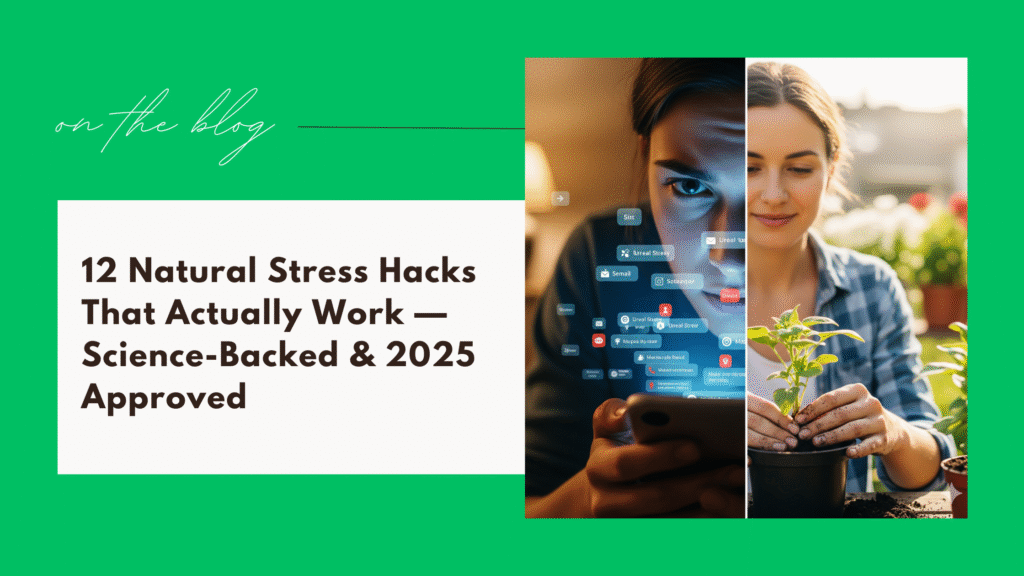Three years ago, I found myself lying awake at 3 AM, my mind racing with tomorrow’s deadlines while my heart pounded like I’d just run a marathon. That’s when I realized I desperately needed to discover natural ways to reduce stress before my health completely spiraled out of control.
After countless sleepless nights and mounting anxiety, I embarked on a transformative journey to find holistic solutions that didn’t involve prescription medications. What I discovered changed my life entirely, and today, I’m sharing these powerful techniques that helped me reclaim my peace of mind.
The Hidden Cost of Chronic Stress
Before diving into solutions, let me share why addressing stress naturally became my mission. Chronic stress doesn’t just make us feel overwhelmed—it literally rewires our brain and damages our body at the cellular level. During my research, I learned that prolonged stress increases cortisol levels, weakens our immune system, and accelerates aging.
Moreover, I noticed how stress was affecting every aspect of my life. My relationships suffered, my work performance declined, and I constantly felt like I was drowning in daily responsibilities. However, the turning point came when I realized that natural stress reduction methods could restore balance without the side effects of pharmaceutical interventions.
12 Natural Ways to Reduce Stress That Transformed My Life
1. Deep Breathing Techniques: My Daily Reset Button
The first natural method I discovered was conscious breathing, and it became my most powerful stress-reduction tool. Whenever I feel overwhelmed, I practice the 4-7-8 breathing technique: inhaling for 4 counts, holding for 7, and exhaling for 8.
Furthermore, I’ve found that combining breathwork with meditation creates an even more profound calming effect. Research shows that deep breathing activates the parasympathetic nervous system, instantly reducing stress hormones in our bloodstream.

2. Herbal Remedies: Nature’s Pharmacy
My exploration of herbal solutions opened up a world of natural stress relief. I started incorporating adaptogenic herbs like ashwagandha and rhodiola into my daily routine. These powerful plants help our bodies adapt to stress more effectively.
Additionally, I brew chamomile tea every evening, which has become my sacred wind-down ritual. The ritual itself is as calming as the herb’s natural compounds. Studies indicate that chamomile contains apigenin, a compound that binds to brain receptors to promote relaxation.
3. Progressive Muscle Relaxation: Releasing Physical Tension
Initially, I didn’t realize how much tension I carried in my body until I started practicing progressive muscle relaxation. This technique involves systematically tensing and releasing different muscle groups, starting from your toes and working upward.
Consequently, I discovered that physical relaxation directly influences mental calmness. When I release muscle tension, my anxious thoughts naturally begin to quiet down. This mind-body connection became a cornerstone of my stress management approach.
4. Nature Immersion: My Green Prescription
Spending time in nature became my most enjoyable stress-reduction strategy. Whether it’s a morning walk in the park or weekend hiking adventures, connecting with the natural world instantly shifts my perspective and calms my nervous system.
Research supports what I experienced firsthand—spending just 20 minutes in nature significantly lowers cortisol levels. The Japanese practice of “forest bathing” or shinrin-yoku has shown remarkable benefits for stress reduction and overall well-being.

5. Regular Exercise: Moving Stress Away
Exercise became my natural antidepressant and stress reliever. I started with gentle yoga sessions and gradually incorporated more vigorous activities like cycling and swimming. Physical activity releases endorphins, our body’s natural mood elevators.
Moreover, I discovered that even 15-minute walks during stressful workdays dramatically improve my mental clarity and emotional state. The key is finding movement that feels enjoyable rather than another obligation on your to-do list.
6. Mindful Meditation: Training My Mind
Meditation initially felt impossible—my mind seemed too chaotic to sit still. However, I started with just five minutes daily using guided meditation apps. Gradually, I built up to longer sessions and noticed profound changes in my stress response.
Furthermore, mindfulness meditation taught me to observe stressful thoughts without getting swept away by them. This shift in perspective became invaluable during challenging situations. Research shows that regular meditation literally changes brain structure, increasing areas associated with emotional regulation.
7. Aromatherapy: Scents That Soothe
Essential oils became powerful allies in my stress-reduction toolkit. Lavender oil helps me unwind in the evening, while peppermint provides energizing clarity during overwhelming moments. I use a diffuser in my bedroom and carry a small rollerball for on-the-go relief.
Additionally, I learned that certain scents trigger immediate relaxation responses in our limbic system. The olfactory system directly connects to brain areas that process emotions and memories, making aromatherapy uniquely effective for stress management.

8. Journaling: Processing Through Writing
Writing became my therapy and stress-processing tool. Every morning, I spend ten minutes doing stream-of-consciousness journaling, dumping all worries and thoughts onto paper. This practice clears mental clutter and provides emotional release.
Subsequently, I started gratitude journaling, which shifted my focus from stressors to blessings. Research demonstrates that gratitude practices significantly improve mental health and reduce stress-related symptoms.
9. Quality Sleep: My Foundation for Resilience
Improving my sleep quality became fundamental to managing stress naturally. I created a consistent bedtime routine, eliminated screens an hour before sleep, and invested in blackout curtains. Quality rest dramatically improves our ability to handle daily stressors.
Furthermore, I learned that sleep deprivation increases cortisol production and impairs emotional regulation. Prioritizing 7-9 hours of quality sleep became non-negotiable for maintaining my stress-free lifestyle.
10. Social Connection: The Power of Community
Isolation amplifies stress, so I prioritized nurturing relationships and building supportive connections. Whether it’s calling a friend, joining community groups, or simply sharing concerns with trusted family members, social support provides powerful stress relief.
Additionally, I discovered that helping others reduces my own stress levels—volunteering became both meaningful and therapeutic. Human connection releases oxytocin, often called the “love hormone,” which naturally counteracts stress hormones.
11. Creative Expression: Art as Therapy
Engaging in creative activities became my joyful stress outlet. I started painting, playing guitar, and exploring photography. Creative expression provides meditative focus while offering emotional release and personal fulfillment.
Moreover, I learned that creative activities activate the brain’s reward system, producing feel-good neurotransmitters that naturally combat stress. The key is choosing activities that feel playful rather than pressured.
12. Nutrition for Stress Support
Finally, I transformed my diet to support stress resilience. I increased omega-3 rich foods like salmon and walnuts, added magnesium-rich dark leafy greens, and reduced caffeine and sugar consumption. Proper nutrition provides the building blocks for neurotransmitters that regulate mood and stress response.
Additionally, I started meal prepping to reduce daily decision fatigue. When healthy foods are readily available, I’m less likely to reach for stress-inducing processed options during busy periods.

User Queries from Reddit and Online Communities
Based on popular questions from stress management communities, here are additional insights:
“How quickly do natural stress reduction methods work?” From my experience, breathing techniques and aromatherapy provide immediate relief, while methods like exercise and meditation show significant benefits within 2-4 weeks of consistent practice.
“Can I combine multiple natural stress reduction techniques?” Absolutely! I found that combining approaches creates synergistic effects. For example, I often practice aromatherapy while doing yoga or listen to nature sounds during meditation.
“Are natural methods effective for severe anxiety?” While natural approaches significantly helped my stress levels, severe anxiety may require professional support. I recommend consulting healthcare providers while incorporating these natural techniques as complementary strategies.
Building Your Personal Stress-Reduction Toolkit
Creating an effective stress management system requires experimentation and consistency. I recommend starting with 2-3 techniques that resonate with you, then gradually adding others. Track your progress and notice which methods provide the most significant relief for your unique situation.
Remember that natural stress reduction is a practice, not a destination. Some days will be more challenging than others, and that’s completely normal. The goal is building resilience and having reliable tools available when stress levels rise.
FAQs
In my experience, breathing techniques and aromatherapy provide immediate relief, while lifestyle changes like regular exercise and meditation show significant benefits within 2-4 weeks. Consistency is key for long-term transformation.
Natural techniques can be incredibly effective for managing stress, but I always recommend consulting with healthcare providers before making changes to prescribed medications. Many people successfully use natural methods as complementary approaches.
Effectiveness varies by individual, but I found deep breathing and regular exercise provided the most immediate and lasting benefits. The best approach is often a combination of techniques tailored to your lifestyle and preferences.
I started with just 10-15 minutes daily and gradually increased to 30-45 minutes. Even five minutes of deep breathing can make a significant difference. Quality matters more than quantity. How long does it take to see results from natural stress reduction methods?
Can natural methods replace stress medication?
Which natural stress reduction method is most effective?
How much time should I dedicate daily to stress reduction practices?
Conclusion
Discovering natural ways to reduce stress transformed my life from chaotic overwhelm to peaceful resilience. These twelve evidence-based techniques provided me with sustainable tools for managing life’s inevitable challenges without relying on medications or unhealthy coping mechanisms.
Remember that everyone’s stress-reduction journey is unique. Start with techniques that feel most accessible and gradually build your personal toolkit. The path to natural stress relief requires patience and consistency, but the rewards—improved health, better relationships, and genuine peace of mind—are absolutely worth the investment.
Your stress doesn’t have to control your life. With these natural approaches, you can reclaim your calm and create lasting well-being that radiates into every aspect of your daily experience.


